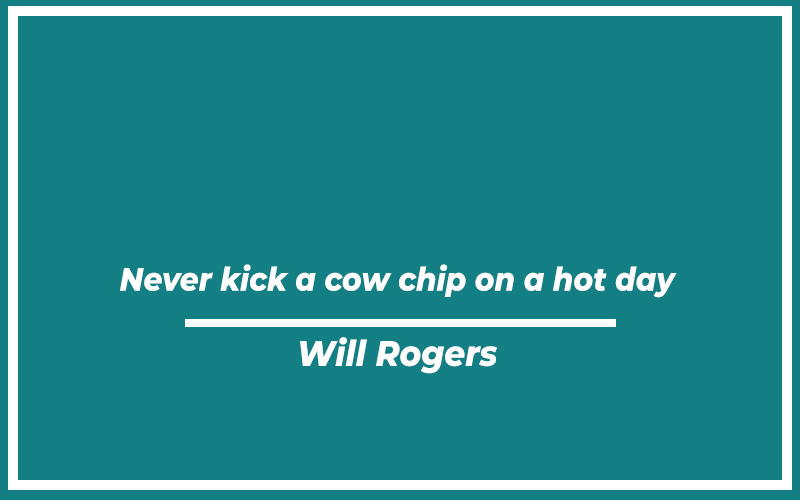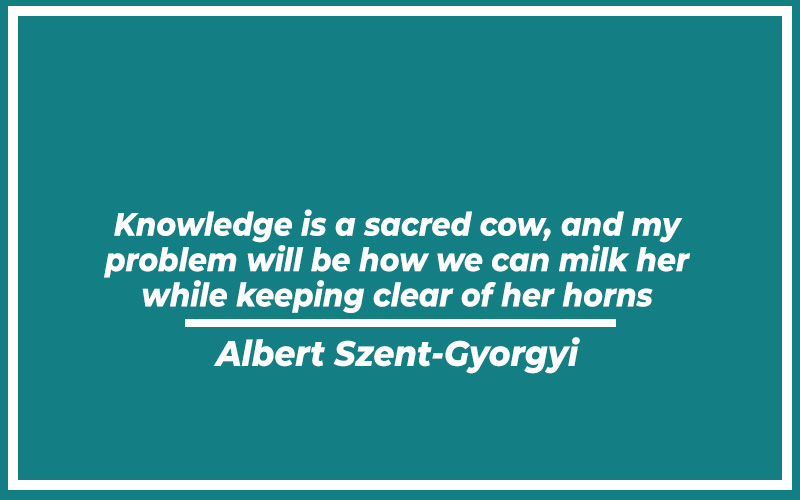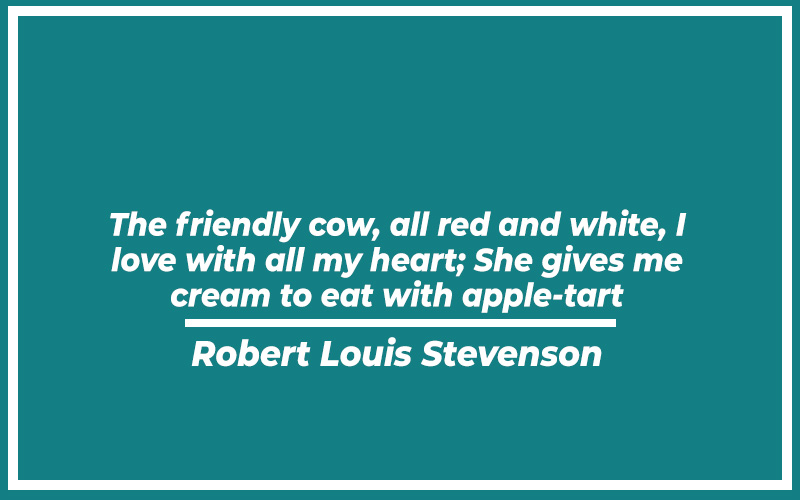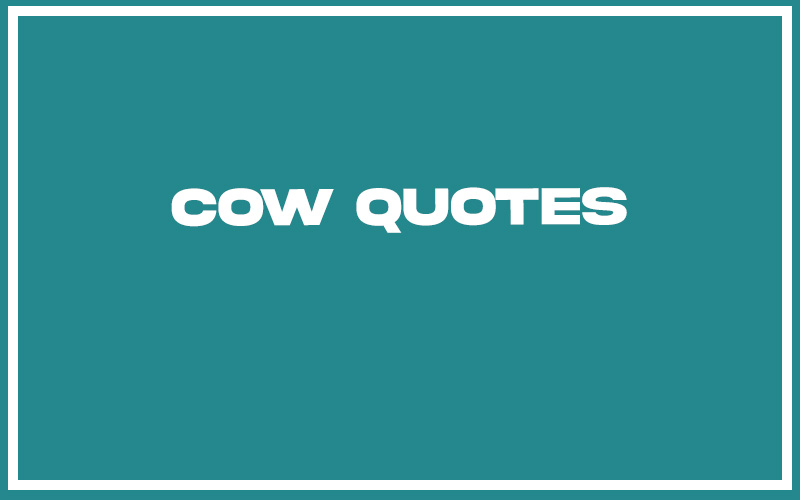Cows might seem like peaceful giants grazing in the pasture, but they’ve inspired a surprising variety of quotes. These sayings range from the humorous to the insightful, reflecting on the simple pleasures of country life, the importance of relaxation, and the bond between humans and these animals.
So, whether you’re a farmhand, a city dweller who appreciates cheese, or just someone who enjoys a good pun, there’s likely a cow quote out there that will moo-ve you.
Cow Quotes

“Never kick a cow chip on a hot day.” – Will Rogers
This humorous quote by Will Rogers uses a vivid image from rural life to make a broader point about avoiding unnecessary actions that could make a situation worse.
Kicking a cow chip (dried cow dung) on a hot day would obviously result in a mess, suggesting that sometimes it’s best to leave well enough alone rather than risk making a situation dirtier or more complicated.
Also Read: Quotes about Betrayal (with Explanation)
“If you do not milk the cow fully, it falls sick.” – Lalu Prasad Yadav
Lalu Prasad Yadav’s quote draws a parallel between livestock care and handling responsibilities or tasks in life. It emphasizes the importance of thoroughness and attention to detail.
Just as a cow needs to be fully milked to remain healthy, our duties and responsibilities must be completely fulfilled to ensure overall well-being and success. The quote underlines the necessity of diligence and the potential negative consequences of neglect or partial efforts.
“Playing golf is like chasing a quinine pill around a cow pasture.” – Winston Churchill
Winston Churchill uses this quote to humorously express his opinion on golf, likening it to the absurdity and challenge of chasing a bitter pill in a cow pasture.
This metaphor illustrates the difficulty and frustration he finds in the game, comparing it to an activity that seems both trivial and challenging. It conveys his skepticism about golf’s value, highlighting the subjective nature of leisure activities and how one’s perception can vary widely.
“To give your sheep or cow a large, spacious meadow is the way to control him.” – Shunryu Suzuki
Shunryu Suzuki’s quote offers wisdom on managing both livestock and life. By providing ample space and freedom, one can indirectly exercise control and create a harmonious environment.
This principle can apply to relationships, personal growth, and leadership, suggesting that autonomy and respect foster better outcomes than rigid control. It highlights the importance of creating conditions that allow for healthy behaviors.
“Cows are a lot smarter across the board than bulls.” – Thomas Haden Church
Thomas Haden Church’s quote humorously acknowledges the intelligence of cows compared to bulls. This observation may relate to the calmer, more deliberate nature of cows versus the often more aggressive and less predictable behavior of bulls.
It can be extended metaphorically to suggest that those who are more composed and thoughtful often demonstrate greater wisdom and problem-solving abilities than those who act impulsively or aggressively.
“The facts are like cows. If you look them in the face hard enough they generally run away.” – Dorothy L. Sayers
Dorothy L. Sayers’ quote creatively suggests that facts, much like cows, can be elusive when confronted directly. This metaphor implies that over-analyzing or aggressively questioning facts can sometimes lead to confusion or misinterpretation, rather than clarity.
It highlights the delicate balance between seeking truth and overwhelming it with scrutiny, suggesting that sometimes a gentler approach may yield better understanding.
“Men are not so much the keepers of herds as herds are the keepers of men.” – Henry David Thoreau
Henry David Thoreau’s quote reflects on the symbiotic relationship between humans and livestock, particularly in agricultural societies. It suggests that while humans tend to and control herds, these animals equally shape human lives, routines, and societies.
This perspective underscores the interdependence between humans and nature, emphasizing that our roles as caretakers also bind us to the rhythms and needs of the natural world.
“All the really good ideas I ever had came to me while I was milking a cow.” – Grant Wood
Grant Wood’s quote humorously suggests that mundane, routine tasks like milking a cow can be fertile ground for creativity and inspiration.
This highlights the idea that moments of quiet and repetitive activity can free the mind to wander and generate innovative thoughts.
“A cow’s heaven is a flower’s idea of hell.” – Oliver Gaspirtz
Oliver Gaspirtz’s quote humorously contrasts the perspectives of cows and flowers, illustrating how one entity’s paradise can be another’s nightmare.
This contrast highlights the subjective nature of preferences and experiences, emphasizing that what benefits one might be detrimental to another. Always consider different viewpoints and recognize that situations are not universally beneficial or harmful, but depend on individual perspectives and needs.
“Moo may represent an idea, but only the cow knows.” – Mason Cooley
Mason Cooley’s quote suggests that while a simple sound like “moo” might seem to represent a straightforward idea, only the cow truly understands its full meaning.
This reflects the broader theme of communication and interpretation, indicating that true understanding often lies beyond the surface and within the context of personal experience.
“I never saw a purple cow; I never hope to see one; But I can tell you, anyhow, I’d rather see than be one.” – Gelett Burgess
Gelett Burgess’s whimsical rhyme emphasizes the rarity and absurdity of a purple cow, expressing a preference for witnessing unusual phenomena over being one.
This playful quote underscores the human fascination with the extraordinary and the preference for observation over participation in the bizarre. It can also suggest a comfort in normalcy and a humorous reluctance to stand out in an unconventional way.
“You can only milk a cow so long, then you’re left holding the pail.” – Hank Aaron
Hank Aaron’s quote uses the process of milking a cow as a metaphor for resource extraction or taking advantage of opportunities. It suggests that there are limits to how much one can draw from a source before it runs dry, urging prudence and sustainability.
This wisdom can apply to various aspects of life, from financial management to personal relationships, advocating for a balanced approach to utilizing resources.
“No longer diverted by other emotions, I work the way a cow grazes.” – Kathe Kollwitz
Kathe Kollwitz’s quote draws a parallel between her focused work ethic and a cow’s methodical grazing. By eliminating distractions, she can concentrate fully on her tasks, much like a cow steadily eating grass.
This comparison underscores the importance of dedication and a single-minded approach to achieving one’s goals. It also highlights the tranquility and productivity that can come from focusing solely on the task at hand.

“Knowledge is a sacred cow, and my problem will be how we can milk her while keeping clear of her horns.” – Albert Szent-Gyorgyi
Albert Szent-Gyorgyi’s quote metaphorically presents knowledge as a valuable but potentially dangerous resource. The challenge lies in extracting and utilizing this knowledge effectively while avoiding the pitfalls or consequences associated with it.
This highlights the careful balance needed in the pursuit of understanding, advocating for a respectful and cautious approach to learning and applying knowledge.
“If happiness truly consisted in physical ease and freedom from care, then the happiest individual would not be either a man or a woman; it would be, I think, an American cow.” – William Lyon Phelps
William Lyon Phelps humorously suggests that if happiness were solely about comfort and lack of worry, then cows, with their simple, carefree lives, would be the happiest beings.
This quote invites reflection on the nature of happiness, implying that it encompasses more than just physical comfort. It suggests that intellectual, emotional, and social fulfillment are also crucial components of true happiness, beyond mere physical ease.
Sacred cows make the best hamburger.” – Mark Twain
Mark Twain uses the concept of a ‘sacred cow’ metaphorically to challenge societal norms and ideas that are often held beyond criticism.
By suggesting that ‘sacred cows make the best hamburger,’ he playfully proposes that breaking down revered traditions can yield rewarding and substantial outcomes, encouraging a questioning of the status quo.
“Who discovered we could get milk from cows, and what did he think he was doing at the time?” – Billy Connolly
Billy Connolly’s quote injects humor into the origins of dairy farming, questioning the initial logic behind milking cows.
It highlights human curiosity and innovation, prompting us to think about the unconventional thinking that has led to everyday practices.
“The cow is nothing but a machine which makes grass fit for us people to eat.” – John McNulty
John McNulty’s quote provides a stark, utilitarian view of cows, emphasizing their role in human agriculture.
It reflects a perspective where animals are primarily seen in terms of their utility to humans, sparking discussions about animal rights and ethical treatment.
“It doesn’t matter how much milk you spill as long as you don’t lose the cow.” – Harvey Mackay
This proverbial advice from Harvey Mackay teaches resilience and perspective.
It suggests that mistakes or losses (spilled milk) are less important than maintaining your core assets or values (the cow), advocating for focusing on what truly matters and not sweating the small stuff.
“Just because a cow stands in a field all day doesn’t make it a philosopher.” – Vaseem Khan
Vaseem Khan’s quote humorously addresses the idea of appearances versus reality.
Just as a cow’s presence in a thoughtful pose does not make it a philosopher, human presence or participation in intellectual environments doesn’t necessarily imply depth of thought or understanding.
“If I have to, I’ll go and direct theater and talk till the cows come home.” – Ridley Scott
Ridley Scott uses the phrase “till the cows come home” to express his willingness to engage in lengthy discussions or endeavors, particularly in directing theater.
It speaks to his dedication and passion for his craft, willing to persist in his efforts indefinitely.
“I can tell a good cowboy by the way he approaches a cow.” – Henry Green
Henry Green’s quote highlights the connection between a cowboy’s character and his approach to livestock. It suggests that respect, care, and skill in handling animals are reflective of one’s overall competence and demeanor.
This can be extrapolated to suggest that how individuals approach tasks and relationships in life reveals much about their character and abilities. It emphasizes the importance of respect and understanding in all interactions, whether with animals or people.
“As for butter versus margarine, I trust cows more than chemists.” – Joan Dye Gussow
Joan Dye Gussow’s quote reflects a preference for natural, traditional food sources over processed alternatives. It conveys a skepticism towards industrial food production and a trust in the simplicity and purity of natural products.
This sentiment resonates with broader discussions about food quality, health, and the impact of modern food processing. It advocates for a return to more natural and less chemically altered food choices, valuing simplicity and tradition.
“A mind of the caliber of mine cannot derive its nutrient from cows.” – George Bernard Shaw
George Bernard Shaw humorously asserts that his intellectual needs surpass what simple, everyday experiences, like those involving cows, can provide.
This self-assured statement underscores the idea that some individuals require more substantial intellectual stimulation to thrive. It can also be seen as a playful critique of those who might find contentment in simpler pursuits, highlighting the diversity in human needs and interests.
“As a calf follows its mother among a thousand cows, so the (good or bad) deeds of a man follow him.” – Chanakya
Chanakya’s quote draws a parallel between the natural behavior of calves and the inescapable consequences of one’s actions.
Just as a calf can find its mother among many cows, a person’s deeds, whether good or bad, remain with them throughout life. Our actions are always present and impactful, and they help shape our destiny and reputation over time.
“You should never hesitate to trade your cow for a handful of magic beans.” – Tom Robbins
Tom Robbins’ whimsical quote encourages taking risks and embracing the potential for magic and adventure in life.
Trading a cow for magic beans, a reference to the fairy tale “Jack and the Beanstalk,” symbolizes the willingness to gamble on the unknown for the chance at something extraordinary.

“The friendly cow, all red and white, I love with all my heart; She gives me cream to eat with apple-tart.” – Robert Louis Stevenson
Robert Louis Stevenson’s quote captures a simple, pastoral affection for cows and the tangible benefits they provide.
This sentiment evokes a nostalgic appreciation for rural life and the direct connection between humans and their livestock.
Also Read: Nick Saban Quotes (with Explanation)
Final Thoughts
There’s a sort of depth to cows beyond their cud-chewing and gentle moos. These quotes reveal a connection between humans and animals, a bond that’s existed for centuries.
Next time you see a cow grazing in a field, take a moment to appreciate the quiet strength and gentle nature they embody.

